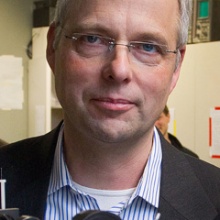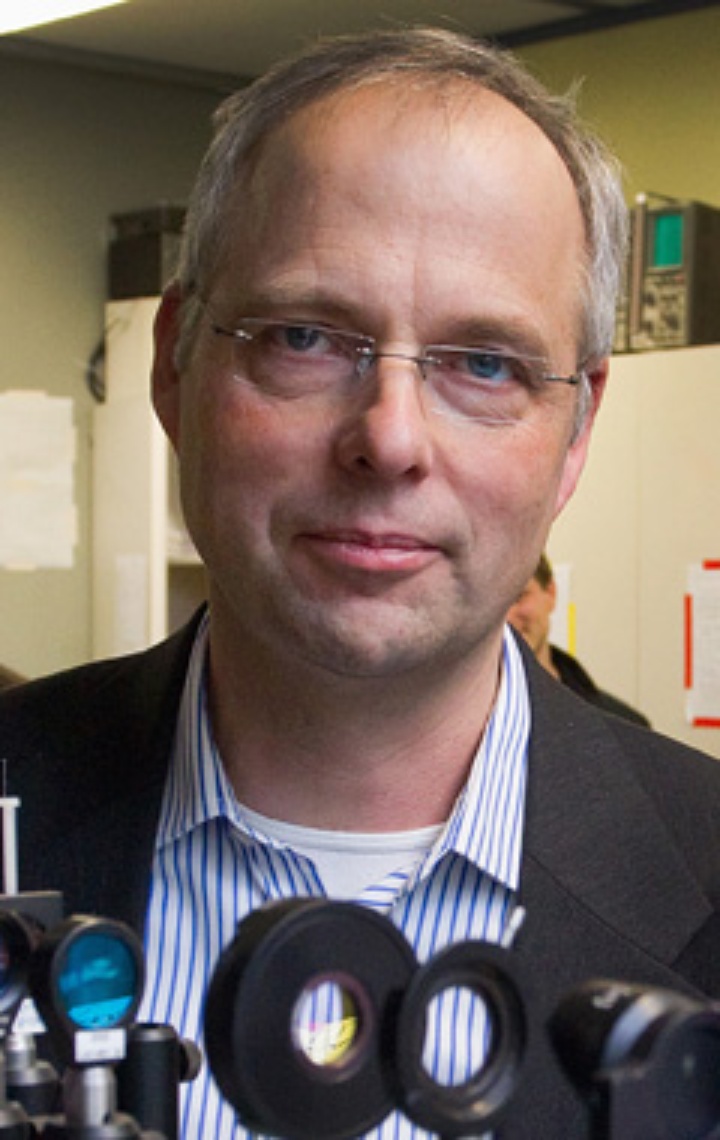Today the German Research Foundation (DFG) has awarded Prof. Jörg Wrachtrup, the head of the 3rd Institute of Physics at the University of Stuttgart the Gottfried-Wilhelm-Leibniz-Prize. The distinction, endowed with 2.5 million Euros, is considered to be the most significant research prize in Germany and is treated as the „German Nobel Prize". Wrachtrup is receiving the award since he developed a completely novel and extremely successful research area at the interface between solid-state physics and quantum optics. Considered to be a particular milestone is the detection of single paramagnetic nitrogen imperfections in the diamond, the so-called NV-centres, which are characterized by an exceptional photo-stability. Wrachtrup recognised as the first scientist the significance of NV-centres for quantum information technology and measurement technology. However, the field of research he essentially established with this reaches far beyond solid-state physics and quantum optics right up to materials and life sciences.
Nearly a year ago the 50-year old Stuttgart physicist had already been awarded an ERC Advanced
Investigator Grant from the European Research Committee. „We are absolutely delighted by the fact
that Prof. Wrachtrup has now succeeded in winning two of the most renowned research awards
worldwide within one year“, according to the Vice-Chancellor of the University of Stuttgart, Prof.
Wolfram Ressel. „In addition the decision by the German Research Foundation underlines once again
the extraordinarily high level of quantum physics in Stuttgart.“
Prof. Wrachtrup and his employees at the 3rd Institute of Physics at the University of
Stuttgart are famous worldwide for their work on the manipulation of single atoms in diamonds and
with this succeeded in having numerous articles published, in particular in the specialist journals
Nature, Nature Physics and Science. The scientists placed single atoms in diamonds in a targeted
way and in this way generated a defect in the diamond lattice. They used the quantum features of
the defects in order to generate novel light sources or sensors with a previously unattained degree
of precision.
In 2009 synthetising diamonds from methane plasma was successful, which is 10,000 times purer
than as flawless stones. In 2010 the group, together with colleagues from the Ruhr University of
Bochum and from Austin/Texas, were able for the first time to place two nitrogen atoms at a
distance of only a few nanometres in such a way that a quantum mechanical coupling developed
through laser excitation, thus marking a further milestone in the direction of quantum computers.
In addition defects in nanodiamonds can also be used in medicine, for example as tumour markers.
Such novel biosensors, unique due to their quantum features, were developed by Wrachtrup and his
team together with biologists and medics.
Prof. Jörg Wrachtrup was born in Herford in 1961 and studied physics at the Berlin Free
University. He gained his PhD there in 1994 with his doctoral thesis on magnetic resonance in
single molecules. After a postdoctoral period at the Institute of Physics at the TU Chemnitz he
qualified as a university lecturer there in 1998 with his work on optical spectroscopy on single
quantum systems in solid objects. He received offers from the universities of Hamburg, Göttingen,
Leipzig, Aachen and Stuttgart. Since January 2000 he has been the head of the 3rd Institute of
Physics at the University of Stuttgart. The interdisciplinary orientation of the research work
performed by Wrachtrup can be reflected in his numerous cooperations with scientific facilities all
over the world. In this respect, for example, he holds the chair of a professorship of excellence
at the ENS in Paris and has worked as a guest professor in Harvard. In 2011 he was appointed a Max
Planck Fellow at the Max-Planck-Institute for Solid State Research in Stuttgart.
The Leibniz-Prize has been awarded by the DFG on an annual basis since 1986 and is also
considered to be one of the most important scientific prizes worldwide; six of the current holders
also received the Nobel Prize at a later date. The distinction in recent years at the University of
Stuttgart was also received by Prof. Frank Allgöwer from the Institute for Systems Theory and
Control Engineering (2004) as well as Prof. Dr. Hans-Joachim Werner (49), Director of the Institute
for Theoretical Chemistry (2000).
Further information:
Prof. Jörg Wrachtrup, University of Stuttgart, 3rd Institute of Physics
Tel. 0711/685-65277/78, email wrachtrup@physik.uni-stuttgart.de.



